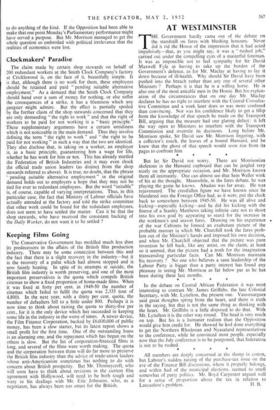Keeping Films Going
The Conservative Government has meddled much less than its predecessors in the affairs of the British film production industry. There may be some connection between this and the fact that there is a slight recovery in the industry—but it is the recovery of a pulse which had almost stopped and is now faintly beating. In spite of its attempts at suicide, the British film industry is worth preserving, and one of the most important preservatives is the quota which compels British cinemas to show a fixed proportion of home-made films. When it was fixed at forty per cent. in 1949-50 the number of cinemas which failed to fulfil the quota was 2,335 (out of 4,800). In the next year, with a thirty per cent. quota, the number of defaulters fell to a little under 800. Perhaps it is now time to think about raising the quota to thirty-five per cent., for it is the only device which has succeeded in keeping some life in the industry in the worst of times. A newer device, the Film Finance Corporation, backed by £6,000,000 of public money, has been a slow starter, but its latest report shows a small profit for the first time. One of the outstanding loans is an alarming one, and the repayment which has begun on the others is slow. But the list of corporation-financed films is long, and several of the films were worth making. The quota and the corporation between them will do far more to preserve the British film industry than the advice of trade-union leaders whose anti-Americanism sometimes has nothing to do with concern about British prosperity. But Mr. Thorneycroft, who will soon have to think about revisions in the current film agreement with Hollywood, will need to be both tough and wary in his dealings with Mr. Eric Johnston, who, as a negotiator, has always been too smart for the British.


































 Previous page
Previous page